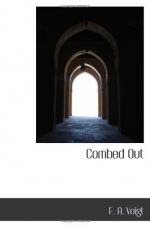Darkness came on and we retired to our tents. I gradually became aware of a faint noise, so faint that I hardly knew whether it was real or not. As soon as I listened intently I could hear nothing. Then one of us said: “What’s that funny noise?” There it was again, a low, hollow sound like that of a distant sea. It grew louder and then ceased. Then it became audible once more and grew louder and still louder. Suddenly we realized what it was—it was the sound of cheering. It came nearer and nearer, gathering speed. It flooded the whole town with a great rush, paused a moment, and then burst over our camp.
Everybody went mad. The men rushed out of the tents and shouted: “It’s over—it’s over—it’s over!” I could hear one shrill voice screaming wildly: “No more bombs—no more shells—no more misery.” The deafening clamour from innumerable throats was topped by the piercing blasts of whistles and the howling of catcalls. A huge bonfire was lit in the camp and sheets of flame shot skyward. The brilliant stars of signal-rockets rose and fell in tall parabolae and lit up all the neighbourhood. The Sergeant-Major blew his whistle with the intention of restoring order. He was answered by a hullabaloo of derisive hoots and yells. He gave up the attempt and instead he headed a procession that marched into the town, banging empty tins and whirling trench-rattles. An anti-aircraft battery opened fire with blank charges. Aeroplanes flew overhead with all lights on.
Many of us went back into our tents and sang with all the power of our lungs.
So the war was over! The fact was too big to grasp all at once, but nevertheless I felt an extraordinarily serene satisfaction. Then someone said: “The people who’ve lost their sons and husbands—now’s the time they’ll feel it.” The truth of this remark struck me with sudden violence. My serenity was broken and I looked into the blackness beneath it. I knew what I was going to see, but, nevertheless, I looked, in spite of myself, and saw innumerable rotting dead that lay unburied in all postures on the bare, shell-tossed earth. A horror of death such as I had never known before came upon me—a crushing, annihilating horror that seemed to impart a fiendish character to the shouting and singing in the camp, as though millions of demoniac spirits were howling and dancing with devilish glee over the accomplishment of the greatest iniquity ever known. At the same time I felt ashamed of not joining in the general jubilation, and bitterly disappointed that my own thoughts—always my worst enemies—should obsess me at this supreme hour. But I knew that the war had lasted too long and that the world’s misery had been too great ever to be shaken off. I also knew that all the dead had died in vain. In order to escape from my intolerable meditations I sat up and began to talk to my neighbour:
“I suppose it’ll be read out officially to-morrow morning?”




